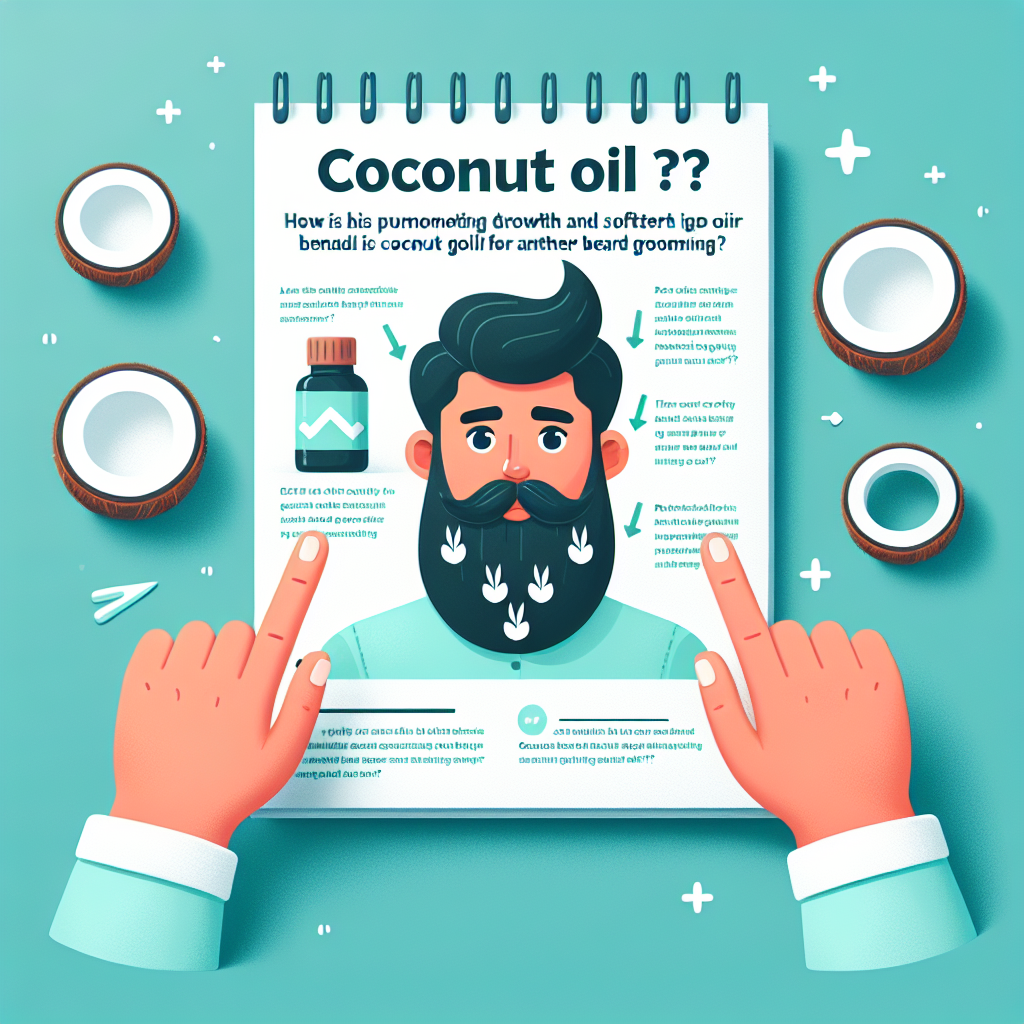Have you ever wondered if coconut oil is the secret ingredient you need to take your beard maintenance game to the next level? Well, you’re not alone. Many beard enthusiasts have turned to this versatile oil for its potential benefits. From moisturizing and softening the beard to promoting healthy growth, coconut oil has garnered quite the reputation. But is it really a match made in grooming heaven? In this article, we’ll explore whether coconut oil is suitable for maintaining your majestic beard and how to use it effectively. So, grab a cup of tea, sit back, and let’s unlock the secrets of coconut oil for your facial hair!
Benefits of Using Coconut Oil for Beard Maintenance
Moisturizes the Beard and Skin
Coconut oil is an excellent natural moisturizer for both the beard hair and the skin underneath. It contains fatty acids that can penetrate the hair shaft, providing deep hydration and preventing dryness. By moisturizing the skin, coconut oil helps to prevent itchiness, flakiness, and irritation.
Prevents Beardruff
Beardruff, or beard dandruff, can be an irritating and embarrassing problem for many men. Coconut oil can help prevent and treat beardruff by moisturizing the skin and reducing dryness and irritation. It also has antifungal properties that can help combat the fungal conditions that contribute to beardruff.
Promotes Healthy Hair Growth
Regular use of coconut oil can promote healthy hair growth by nourishing the hair follicles and providing essential nutrients. The vitamins and minerals in coconut oil, such as vitamin E and lauric acid, help to strengthen the hair and prevent breakage. This can result in a fuller, thicker, and healthier-looking beard.
Strengthens and Conditions the Beard
Coconut oil is a natural conditioner that can help strengthen the beard hair, making it less prone to breakage and split ends. It forms a protective barrier around the hair, sealing in moisture and preventing damage from environmental factors. Regular use of coconut oil can lead to a softer, smoother, and more manageable beard.
Adds Shine and Luster
If you’re looking to achieve a shiny and lustrous beard, coconut oil can be your secret weapon. Its moisturizing properties help to enhance the natural shine of the hair, giving it a healthy and radiant appearance. Coconut oil can also help to tame frizz and flyaways, resulting in a neater and more polished beard.
Reduces Frizz and Split Ends
Frizzy and unruly beard hair can be a common problem, especially for those with curly or coarse hair. Coconut oil can help combat frizz and prevent split ends by nourishing and moisturizing the hair. Its smoothing properties can help to tame flyaways and promote a more controlled and well-groomed beard.
How to Use Coconut Oil for Beard Maintenance
Choose Organic and Unrefined Coconut Oil
When selecting coconut oil for your beard, it’s best to choose organic and unrefined options. Organic coconut oil is free from harmful chemicals and pesticides, making it safer for both your beard and the environment. Unrefined coconut oil retains more of its natural nutrients and beneficial properties.
Perform a Patch Test
Before applying coconut oil to your entire beard, it’s important to perform a patch test to check for any allergic reactions or sensitivity. Apply a small amount of coconut oil to a small area of your skin, such as the inside of your wrist, and wait at least 24 hours to see if it causes any adverse reactions.
Warm the Coconut Oil
Coconut oil tends to solidify at cooler temperatures, so it’s best to warm it up slightly before applying it to your beard. Place the desired amount of coconut oil in a small container and gently heat it using warm water or by rubbing it between your palms. This will make it easier to spread and ensure even distribution.
Apply to the Beard
Once the coconut oil is warmed and liquified, take a small amount and apply it to your beard. Start by rubbing your hands together to evenly distribute the oil, then gently massage it into your beard, starting from the roots and working your way to the tips. Be sure to cover both the beard hair and the skin underneath.
Massage into the Skin
As you apply the coconut oil to your beard, take the time to massage it into the skin as well. This will help stimulate blood flow to the hair follicles and promote healthy hair growth. Massage in circular motions using your fingertips, covering the entire beard area and ensuring the oil is well absorbed.
Leave-in or Rinse Out
Whether you choose to leave the coconut oil in your beard or rinse it out is a matter of personal preference. Leaving it in can provide continuous hydration and nourishment throughout the day. However, if you prefer a lighter feel or notice any greasiness, you can rinse out the excess oil after a certain amount of time.
Frequency of Application
The frequency of applying coconut oil to your beard depends on various factors such as your beard length, hair type, and personal preference. Generally, it’s recommended to use coconut oil on your beard 2-3 times a week. However, you can adjust the frequency based on how your beard responds and your desired level of moisturization.

Considerations and Potential Drawbacks
Allergy or Sensitivity
While coconut oil is generally safe for most people, it’s possible to develop an allergic reaction or sensitivity. Always perform a patch test before using coconut oil on your entire beard and closely monitor your skin for any adverse reactions. If you experience redness, itching, or any discomfort, discontinue use immediately.
Greasy Appearance
One potential drawback of using coconut oil on your beard is that it can leave a greasy appearance if not applied sparingly or rinsed out properly. To avoid this, start with a small amount of coconut oil and gradually increase if necessary. If you notice excess greasiness, consider rinsing out the oil thoroughly after a certain period of time.
Clogging Pores
Coconut oil has a comedogenic rating of 4, which means it has a high likelihood of clogging the pores. While this may not be an issue for everyone, those with acne-prone or sensitive skin should use coconut oil with caution. If you notice any breakouts or increased skin congestion, it may be best to avoid using coconut oil on your beard or opt for a more suitable alternative.
Coconut Oil May Not Suit Everyone
Just like any beard maintenance product, coconut oil may not work for everyone. Each person’s hair type, skin type, and individual preferences can greatly influence the effectiveness and suitability of coconut oil. If you find that coconut oil doesn’t provide the desired results or causes any negative effects, consider trying alternative oils or seeking advice from a dermatologist or beard specialist.
Combining with Other Beard Products
Coconut oil can be a versatile addition to your beard maintenance routine, but it can also be combined with other beard products for enhanced results. Consider using coconut oil as a leave-in treatment and pairing it with a balancing beard wash or conditioner. Experimenting with different combinations can help you find the perfect regimen for your beard’s needs.
Applying at the Right Time of Day
When it comes to applying coconut oil to your beard, timing can make a difference. Some men prefer to apply coconut oil at night and leave it in overnight to reap the benefits while they sleep. Others prefer to apply it in the morning, allowing time for the oil to absorb before going about their day. Find a time that works best for you and your beard care routine.
Alternative Oils for Beard Maintenance
Jojoba Oil
Jojoba oil is a popular alternative to coconut oil for beard maintenance. It closely resembles the natural oils produced by the skin, making it easily absorbed and non-greasy. Jojoba oil can help moisturize the beard, promote healthy hair growth, and prevent dryness and irritation.
Argan Oil
Argan oil is another excellent option for beard maintenance. It is rich in vitamin E and fatty acids, making it a great moisturizer and nourishing treatment for the beard. Argan oil can help soften the hair, reduce frizz, and add shine and luster to the beard.
Grapeseed Oil
Grapeseed oil is a lightweight oil that is easily absorbed by the hair and skin. It moisturizes the beard without leaving a greasy residue and can help strengthen the hair follicles and promote healthy hair growth. Grapeseed oil is also rich in antioxidants that can protect the beard from environmental damage.
Almond Oil
Almond oil is a versatile oil that is suitable for both the hair and skin. It helps to moisturize and condition the beard, making it softer and more manageable. Almond oil can also reduce inflammation and irritation, making it ideal for those with sensitive skin.
Olive Oil
While commonly known for its culinary uses, olive oil can also be beneficial for beard maintenance. It contains antioxidants and essential fatty acids that help nourish and strengthen the hair. Olive oil can add shine, reduce frizz, and improve the overall health and appearance of the beard.

Tips for Maximizing the Benefits of Coconut Oil on Your Beard
Start with a Small Amount
When using coconut oil, it’s best to start with a small amount and gradually increase if necessary. This will help you avoid applying too much oil and prevent a greasy appearance. Remember, it’s easier to add more oil if needed than to remove excess oil from your beard.
Adjust According to Beard Length and Thickness
The amount of coconut oil needed for beard maintenance can vary depending on the length and thickness of your beard. Longer and denser beards may require more oil to ensure adequate coverage and hydration. Experiment with different amounts to find what works best for your specific beard.
Exfoliate and Cleanse Regularly
To keep your beard and skin in optimal condition, it’s important to exfoliate and cleanse regularly. This helps remove dead skin cells, product buildup, and excess oil, allowing the coconut oil to penetrate more effectively. Use a gentle exfoliating scrub or beard brush to exfoliate and a beard wash or shampoo to cleanse.
Avoid Overheating the Oil
When warming the coconut oil, be cautious not to overheat it, as excessive heat can degrade some of its beneficial properties. Opt for gentle warmth through warm water or rubbing it between your palms. This will help maintain the integrity of the oil and ensure maximum effectiveness when applied to your beard.
Use a Beard Brush or Comb
To evenly distribute the coconut oil throughout your beard, use a beard brush or comb. This will help distribute the oil from root to tip, ensuring that every strand is moisturized. It will also help to detangle the beard and give it a more polished and groomed appearance.
Pair with a Balancing Beard Wash
While coconut oil can provide many benefits to your beard, it’s important to maintain a balanced beard care routine. Pairing coconut oil with a specially formulated beard wash or conditioner can help cleanse and balance the beard, removing any excess oil without stripping it of its natural moisture.
Consider Complementing with Other Natural Oils
For an added boost to your beard maintenance routine, consider complementing coconut oil with other natural oils. Experiment with different combinations such as jojoba oil, argan oil, or almond oil to customize a blend that suits your beard’s specific needs. Each oil offers unique benefits and properties that can enhance the overall health and appearance of your beard.
Common Myths and Misconceptions about Coconut Oil for Beard Maintenance
Coconut Oil Leads to Faster Facial Hair Growth
One common myth is that coconut oil has the ability to promote faster facial hair growth. While coconut oil can provide nourishment to the hair follicles, it cannot change the genetic factors that determine the rate and thickness of facial hair growth. The rate of growth is largely determined by genetics and hormones.
Coconut Oil Can Fix Patchy Beards
Another misconception is that coconut oil can miraculously fix patchy beards. Patchy beards are often caused by genetics and hormone imbalances, and while coconut oil can help improve the overall health and appearance of the beard, it cannot magically fill in the patches. Patience and genetic factors are key when it comes to addressing patchiness.
Coconut Oil is a Substitute for Beard Oil
Coconut oil and beard oil are often used interchangeably, but they are not exactly the same. While coconut oil can provide many benefits to the beard, beard oils are specially formulated with a combination of carrier oils and essential oils to provide specific benefits such as fragrance, skin conditioning, and additional nutrients. Coconut oil can be a great addition to a beard oil blend, but it is not a complete substitute.
Only Apply Coconut Oil to a Dry Beard
Contrary to popular belief, coconut oil can be applied to both dry and damp beards. Applying coconut oil to a damp beard can help lock in moisture and provide added hydration. It can also make it easier to evenly distribute the oil throughout the beard. Choose the method that works best for you and your beard care routine.
Scientific Evidence and Studies on Coconut Oil for Hair Health
Moisturizing Properties of Coconut Oil
Scientific studies have shown that coconut oil has moisturizing properties due to its high content of saturated fatty acids. These fatty acids can penetrate the hair shaft, reducing protein loss and improving the hair’s moisture retention. This can result in moisturized and hydrated hair.
Antifungal and Antimicrobial Effects
Coconut oil contains compounds such as lauric acid and capric acid, which have been found to have antifungal and antimicrobial properties. These properties can help combat fungal infections on the skin and prevent the growth of harmful microorganisms that can contribute to skin issues such as beardruff and acne.
Effects on Hair Structure and Protein Loss
Research has shown that coconut oil can reduce protein loss in hair, as it has a high affinity for hair proteins. This can help prevent damage and breakage, leading to stronger and healthier hair. Coconut oil can also improve the structural integrity of the hair, making it more resistant to damage.
Benefits for Skin Health and Inflammation
Coconut oil has been found to have anti-inflammatory properties that can help soothe and calm the skin. It can reduce redness, irritation, and inflammation, making it beneficial for those with sensitive skin or skin conditions such as beardruff or acne. Coconut oil’s moisturizing properties can also help maintain the skin’s barrier function and prevent dryness.
Expert Opinions and Advice on Coconut Oil Usage for Beard Maintenance
Beard Specialists
Beard specialists and grooming experts often recommend coconut oil as a natural and effective option for beard maintenance. They highlight its moisturizing properties, ability to reduce beardruff and irritation, and potential for promoting healthy hair growth. However, they also emphasize the importance of individual experimentation to find the best routine for each beard.
Dermatologists
Dermatologists generally view coconut oil as a safe and beneficial option for beard maintenance. They acknowledge its moisturizing and anti-inflammatory properties, which can help improve skin health and prevent common beard-related issues. Dermatologists may also suggest incorporating coconut oil into a broader beard care routine to address other specific concerns.
Professional Barbers
Many professional barbers include coconut oil in their recommendations for beard maintenance. Barbers recognize its ability to moisturize the beard and skin, reduce frizz, and promote healthy hair growth. They often suggest experimenting with different oils and blends to find the right combination for each individual’s beard needs and preferences.
Internet Community
The internet community, particularly beard enthusiasts and individuals who have tried coconut oil for beard maintenance, often express positive experiences and results. Many share their success stories, noting improvements in beard softness, shine, and overall health. It’s important to remember that individual experiences may vary, and what works for one person may not work the same for another.
Conclusion
Coconut oil offers numerous benefits for beard maintenance, including moisturizing the beard and skin, preventing beardruff, promoting healthy hair growth, and reducing frizz and split ends. It can also add shine and luster to the beard, contributing to an overall well-groomed appearance. While there are considerations and potential drawbacks to using coconut oil, such as the possibility of allergies or a greasy appearance, these can be managed with proper application and adjustments. Additionally, there are alternative oils available for beard maintenance, such as jojoba oil, argan oil, grapeseed oil, almond oil, and olive oil.
To maximize the benefits of coconut oil on your beard, start with a small amount and adjust according to your beard’s length and thickness. Regular exfoliation and cleansing are important to maintain a healthy beard, and it’s crucial to avoid overheating the oil during application. Using a beard brush or comb can help distribute the oil evenly, and pairing coconut oil with a balancing beard wash can provide a well-rounded beard care routine. While there are common myths and misconceptions about coconut oil’s effects on beard growth and patchy beards, scientific evidence supports its moisturizing properties, antimicrobial effects, and benefits for hair structure and skin health.
Expert opinions from beard specialists, dermatologists, professional barbers, and the internet community generally recognize coconut oil as a viable option for beard maintenance. Individual preferences and results may vary, and it’s important to maintain consistency and patience when using coconut oil or any other beard maintenance product. Overall, coconut oil can be a valuable addition to your beard care routine, offering both nourishment and protection for a healthy and well-maintained beard.
